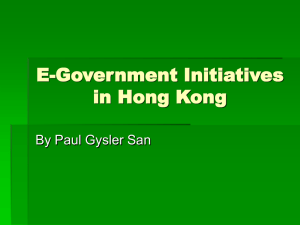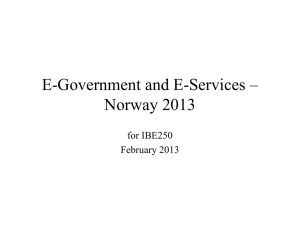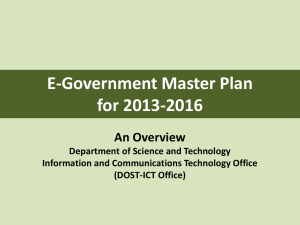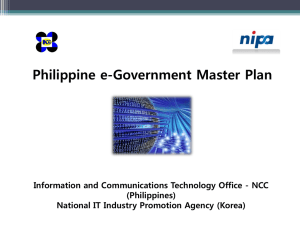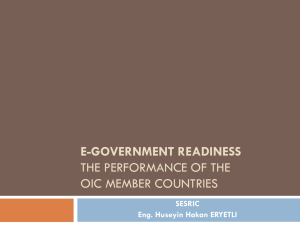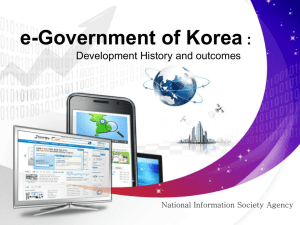Why e-Government - Bahrain International eGovernment Forum
advertisement
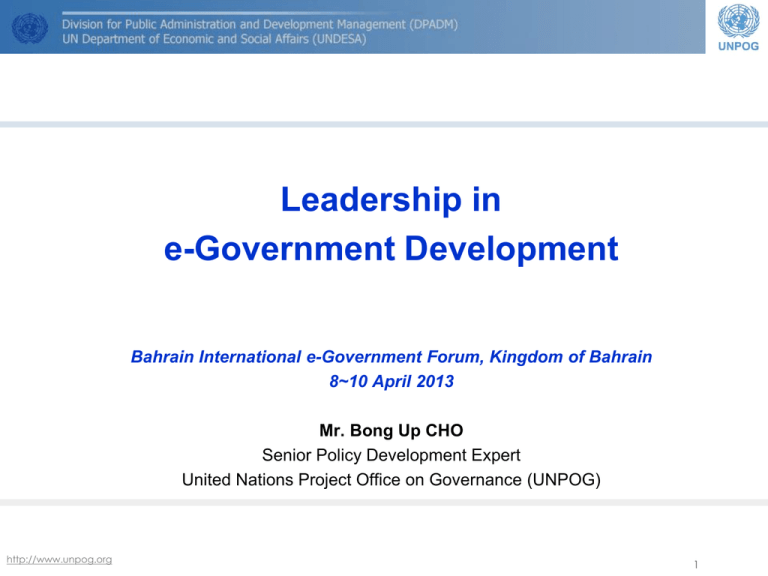
Leadership in e-Government Development Bahrain International e-Government Forum, Kingdom of Bahrain 8~10 April 2013 Mr. Bong Up CHO Senior Policy Development Expert United Nations Project Office on Governance (UNPOG) http://www.unpog.org 1 Contents Introduction of UNPOG Why e-Government ? Challenges of e-Government Development Leadership - Korea Experience - e-Government History as a Presidential Agenda Lessons Learned http://www.unpog.org 2 United Nations Project Office on Governance (UNPOG): Established in 2006, Seoul, Republic of Korea Achieving MDGs Enhancing Governance / e-Governance Sharing Knowledge & Experience Capacity Development http://www.unpog.org Providing Policy Advice & Best Practices Research & Policy Development Raising Awareness & Establishing Partnerships Communications & Outreach 3 .Why e-Government ? National Perspective UN Perspective Better Society Better Government Achieving Millennium Development Goals efficient effective transparent accountable participatory Government United Nations ※ The United Nations believes that e-Government is integral to the socioeconomic development of the peoples of the world. http://www.unpog.org Challenges of e-Government Development - “Leadership Failures” ….Lack of finance….Digital divides….Poor coordination…. Workplace and organizational inflexibility….Lack of trust….Poor technical design - Others : Government officials’ resistance to change, Lack of interoperability between systems, etc. * Research(Aug. 2006) conducted by Oxford Internet Institute ※ Leadership failure can lead to - Low prioritization of e-Government in public policies and resource allocation - Lack of integration of the e-Government agenda with mainstream strategies for public sector reform - Poor strategic vision and planning of e-Government http://www.unpog.org 5 ※ Survey: Major factors for Successful e-Gov. projects Source: ADB staff survey results on e-Gov 2012 http://www.unpog.org 6 Korean Experience e-Government History as a Presidential Agenda http://www.unpog.org 7 ※ Current Status of Korea’s e-Government Phase 1 [Foundation] Consolidation of internal administrative procedure and establishment of common basis Phase 2 [Service Advancement] Advancement of internal administrative procedure Expansion of integrated civil services Selective public service reform Korea is Here ! Phase 2 Phase 1 Level 4 Seamless Level 2 Enhanced Level 1 Emerging Limited web presence Regularly updated contents and information Level 3 Transactional Visa, passport, birth records obtained online Taxes & fees paid online Seamless online service provided by agencies Converged public services 8 1. The Park Administration in 1970s 1) Electronics & Telecommunications Research Institute (ETRI) was established in 1976 to develop new technologies related to ICTs - TDX (Time Division Exchange) to solve the congestion of wire telephone installation across the country including rural areas (’76~’86) * World 10th in development & production of the electronic switching system - D-RAM : Starting with development of 4M DRAM, successfully developed 16M, 64M and 256M DRAM in a row (’85~’94) - World’s first Commercialization of CDMA (Code Division Multiple Access) : foundation of wireless communication (’89~’96) 2) Creation of Masterplan to computerize administrative systems - Masterplan to computerize administrative systems of Government agencies was designed in 1978 to enhance administrative efficiency and upgrade civil services. http://www.unpog.org 9 http://www.unpog.org 10 2. The Chun Administration in 1980s 1) Mr. Oh, Myung, then Vice Minister and Minister of Information and Communications, served about 7 years as a National CIO(’81.5~’88.2) - Coordinated the development of TDX (domestically produced electronic switching system) - Established government-funded company, KT(Korea Telecom) for electronic communications - Founded public telecommunications carrier, Korea Data Communications (Dacom) 2) Computerized National Data in major areas such as resident registration, real-estate, vehicle records, and finance to lay the groundwork for informatization at national level * Focused on storing government records into a digital format. 3) Established National Informatization Agency (NIA) in 1987 - NIA is a statutory agency founded to promote national informatization to develop e-Government-related policies, and to provide technical expertise for national agencies. http://www.unpog.org 11 3. The Kim, Young Sam Administration (1993 ~ 1997) 1) The Framework Act on Informatization Promotion legislated in 1995. - Established the legal basis for promoting informatization on national scale 2) The Informatization Promotion Committee (chaired by the Prime Minister and included other ministers among its members) was organized to supervise the informatization plans & policies of each ministry. 3) The Informatization Promotion Fund established in 1996. - Enabled the government to invest intensively in promoting e-Government, developed technology & manpower and established IT infras, serving as a stable foundation for Korea’s informatization. 4) High-speed Information and Communications Networks - In 1995, started to build a nationwide fiber optic network and a high- speed transmission network and completed the construction in 2005 at a cost of USD 32 billion. http://www.unpog.org 12 4. The Kim, Dae Jung Administration (1998 ~ 2002) 1) Creation of a Chief Information Officer (CIO) across the government and local governments to sustain attention and prioritization of e-Government (‘98.9) 2) IT Training for 10 million citizens (taxi-drivers, housewives, the old, etc.) taught how to use internet, and the use of word processing (2000) 3) The Electronic Government Act * enacted in 2001 to build foundation for e-Government promotion. * first in the world 4) The Special Committee for e-Government created in 2001 to promote interagency collaboration concerning the e-Government initiatives. ※ A joint civilian-government committee under the supervision of the President 5) Selected and carried out 11* major initiatives for e-Government (2001~2002) - Citizen-oriented(front office) : G4C, Home Tax Service, e-Procurement, Social Insurance Information System - Administrative Efficiency(back office) : Finance, Education, Local Gov’t, Personnel - Infra for e-Government : e-Approval & e-Document between agencies, e-Signature, Government-wide integrated computer network http://www.unpog.org 13 5. The Roh Administration (2003 ~ 2007) 1) Presidential Committee on Gov’t Innovation & Decentralization launched in 2003 - Selected and Implemented 31 e-Government project initiatives 2) Establishment of Government Integrated Data Center (GIDC) - Separately and individually operated information systems of 47 government agencies were integrated and managed together. 3) Construction of ‘e-Participation Portal’ (e-People) - Integrated the systems of all central governments and diplomatic missions and connected the systems of local governments & major public institutions. - Facilitated citizen participation in the decision-making process by allowing their complaints, policy proposals to be addressed through a single window. 4) Introduction of ‘Digital Budget & Accounting System’ (d-Brain) - As d-Brain was connected to 63 other systems of 46 institutions including Public Procurement Service & National Tax Service, - efficiency and transparency have been improved in national finance management such as revenue generation, budget planning, execution & settlement. http://www.unpog.org 14 6. The Lee Administration (2008 ~ Feb. 2013) 1) Establishment of Presidential Council on National Informatization - Prime Minister`s Council on Informatization has been promoted to the Presidential Council to coordinate informatization policies 2) Integration and Connection of the e-Government services - Online Civil Service Portal (G4C), Korea e-Government Portal (www.korea.go.kr) and One-stop Business Support Service (G4B) provide integrated and customized services for citizens and businesses As a result, Korea ranked first in the UN e-Government Surveys in both 2010 and 2012 consecutively. (Next Step) The New Administration is planning to implement ‘Smart e-Government’ that enables users to enjoy easy & free access to government services regardless of the delivery channel. * Launch of Open Government Data Portal (www.data.go.kr) (March 2013) http://www.unpog.org 15 UN Global e-Government Readiness Index Rank 2012 2010 2008 2005 2004 2003 1 Korea Korea Sweden USA USA USA 2 Netherlands USA Denmark Denmark Sweden Australia 3 UK Canada Norway UK Australia New Zealand 4 Denmark UK USA Sweden Denmark Singapore 5 USA Netherlands Netherlands Korea UK Norway 6 France Norway Korea Australia Canada Canada 7 Sweden Denmark Canada Canada Norway UK 8 Norway Australia Australia Singapore Switzerland Netherlands 9 Finland Spain France Finland Germany Denmark 10 Singapore France UK Norway Finland Germany 11 Canada Singapore Japan Netherlands Netherlands Sweden 12 Australia Sweden Switzerland Germany Singapore Belgium 13 New Zealand Bahrain Estonia New Zealand Korea Finland 14 Liechtenstein New Zealand Luxembourg Iceland New Zealand France 15 Switzerland Germany Finland Switzerland Iceland Korea http://www.UNPAN.org/DPADM/ 16 Lessons Learned http://www.unpog.org 17 Lessons Learned from Korea’s e-Government 1) Informatization on the basis of Research & Development - Technology Development : Electronics & Telecommunications Research Institute (ETRI, in 1976) * (USD 825, per capita GDP of Korea) ETRI has been making significant efforts to provide Korea with a remarkable growth in the area of ICTs - Policy Development & Provision of Technical Expertise : National Informatization Agency (NIA, in 1987) As the agency responsible for the overall informatization of the nation, NIA has been providing expertise in developing and implementing the Nat’l Framework Plan on Informatization Promotion 2) From Top-down Approach to Bottom-up Approach - At the beginning, most projects on National Informatization were initiated by upperlevel officials including Presidents. - As time went by, focused on taking a bottom-up approach to prioritize and implement e-Government projects. http://www.unpog.org 18 Lessons Learned from Korea’s e-Government 3) To the Implementation of Integrated & Connected Projects from Individual Projects - At the initial stage, e-Government projects and the information system were executed and operated by respective ministries. - As citizen-centered services get more importance and the information society becomes more advanced, it has implemented e-Government projects* focusing on connection and integration. * GIDC, Online Civil Service Portal, e-People, d-Brain Finance system, etc. 4) Historical Roles & Responsibilities among Presidents (Continuity of e-Government) - Top-leadership fully understood the importance of ICTs & e-Government in socioeconomic development and made an aggressive investment on them for more than 30 years consistently. * Making Foundation (R&D: ETRI) → Computerization Basic National Information (DB) → Establishment of Policy Development Institute(NIA) → Construction of Infrastructure → Creation of Enabling Environments ; Law, Institutions, and Fund → Implementation of Major e-Government Projects http://www.unpog.org 19 Triangle of e-Government Development e-Government Strategy Technology Development http://www.unpog.org Policy Development 20 e-Government is A Journey, not a destination http://www.unpog.org 21 Thank you for your attention! http://www.unpog.org 22
